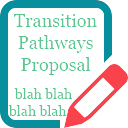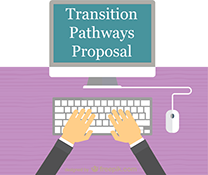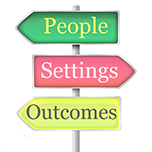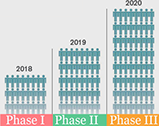Create a university-based program incubator
First published December 5, 2016; Updated January 18, 2017
 My goal for Transition Pathways was to have created, at the end of 5-6 years, a specific set of services and program development activities for each of our partners (The School District of Philadelphia, CISWorks, and Drexel University), and then to have shifted responsibility for sustaining these functions back onto identified staff within each of the partner agencies. I expected that these partners would then manage these established programs, and eventually initiate other program expansion and improvement, perhaps with consultation from us. This was critical to our long-term goal of building capacity within the community, and seeding the potential for growth at a rate that might begin to meet the needs of the growing population of adults on the spectrum. In the long term, I also hoped that they might turn back to the Autism Institute as partners in research and training grants with the Institute.
My goal for Transition Pathways was to have created, at the end of 5-6 years, a specific set of services and program development activities for each of our partners (The School District of Philadelphia, CISWorks, and Drexel University), and then to have shifted responsibility for sustaining these functions back onto identified staff within each of the partner agencies. I expected that these partners would then manage these established programs, and eventually initiate other program expansion and improvement, perhaps with consultation from us. This was critical to our long-term goal of building capacity within the community, and seeding the potential for growth at a rate that might begin to meet the needs of the growing population of adults on the spectrum. In the long term, I also hoped that they might turn back to the Autism Institute as partners in research and training grants with the Institute.
Related Content
In the process, I realized that I had effectively defined one approach to program incubation: i.e., the identification of an emerging need related to services or program development in a community-based partner (and, in our case, a university department); the development of a plan to meet that need; the implementation of the plan by a backbone organization in partnership or on behalf of partner agencies during the critical growth phase, and; a plan to transition management back to the partner by the end of the project. While the concept of program incubation has generated considerable excitement within business and other communities, I believe that this is one of the most ambitious and comprehensive demonstration to date of how a university might assist in the incubation of other programs serving people with ASD.
This definition is different - and, I would argue, much more meaningful - than that implicit in claims made by others. I have seen the term "incubator" used to describe efforts to simply gather or funnel funding to community-based agencies seeking to pilot new programs, to simply host a program run by another agency, to help implement a pre-existing treatment package in another agency, and to adapt a practice and then provide training to community-based programs. While these efforts may help to close gaps in implementation, they do not create programs that can grow without additional support, with the capacity to replicate themselves.
 With long-term planning and support, a university can spur capacity by incubating new programs of services and training on behalf of community-based agencies. Successful incubation as defined above depends on many other program characteristics and draws on many other lessons:
With long-term planning and support, a university can spur capacity by incubating new programs of services and training on behalf of community-based agencies. Successful incubation as defined above depends on many other program characteristics and draws on many other lessons:
- The different stages in the development of the program and transition back to the partner agency necessitates a phased approach.
- There is a specific agreement between the lead agency and the partner, perhaps similar to the backbone for a community-based collaborative I proposed here
- Sustainability and continued growth presumes a heavy focus on the kind of program development many agencies cannot easily undertake.
- This model also draws on the lessons I had learned about co-leadership, and goes far beyond the very limited types of consultation most universities are prepared to provide.
- The funding model is key; whereas in our case we could draw heavily on philanthropy, it is possible that some of the funding might also come from the partner agencies themselves.
Examples of incubation
Incubate a multi-agency collaborative
I would establish inter-agency agreements as needed between the school district, adult provider agencies, university, and other related entities. I would actively coordinate the program at Drexel. I would help to identify and negotiate resources needed to sustain these partnerships prior to the end of our involvement.
Incubate experts within partner agencies
I planned on incubating individual professionals from partner agencies who are already demonstrating initiative and innovation into experts and leaders through their involvement in the program. I designed 2 of the 3.5 FTEs that were gift-funded and Drexel-based as trainer/coach positions, expecting to hire from staff within partner agencies. These staff would join the backbone for 2-3 years at a time, at the end of which they would return to our community-based partner with valuable experience in training and mentoring. At the end of five years, I would have expected to retain 1 to 1.5 positions at Drexel to support ongoing leadership training in these kinds of services, funded through grants or other fees.
Incubate a program of peer mentoring at Drexel
Drexel University had established a support program for Drexel students on the spectrum that included peer mentors. While the program had long been recognized as needing a complete overhaul, no one within Drexel had taken leadership in identifying and injecting significant new resources; indeed, Drexel's President had instituted significant cuts the previous year to the program. I proposed to expand and improve the existing peer mentor program to support Transition Pathways students, which would offer a chance to re-evaluate the role of peer mentors for matriculating students on the spectrum.
Incubate a program to support employees with ASD at Drexel
In discussion with Drexel University, the Office and Vocational Rehabilitation, and CIS Works, I discovered that there was no active program to hire and support people with developmental disabilities at Drexel. I planned on using the training and coaching resources developed through the program to help CISWorks to build the capacity to support not just Transition Pathways graduates but other persons with disabilities hired at Drexel.
Incubate other professional and program development functions
For each agency, I planned on creating new programs of professional development surrounding ASD, employment, person-centered planning, and community engagement. I also planned on incubating key program development functions that would benefit Transition Pathways, address other key gaps in services provided or planning undertaken by partners, and lay a foundation for growth and improvement. I identified possible projects in preliminary conversations with each of these agencies. For example, the School District of Philadelphia served potential Transition Pathways participants in classrooms across the city. I proposed to work with the district to identify several feeder schools that would not only channel potential participants but over time would become potential preparation/replication sites. To that end, we would invite staff from those schools to all workshops offered as part of our program, and extend coaching and other supports whenever feasible.
 Philanthropists can play a unique and essential role as the funders of incubators and accelerators of new programs of community-based services. Developing new services is a risky endeavor. The business of innovation in ASD requires that you identify an emerging opportunity and then recruit the expertise and core staff needed. It may need to draw on many different lessons: How do you draw a straight line from research to practice and to your program? What steps can you take to improve your program? The Transition Pathways Proposal itself illustrates how some of these lessons can be applied. But business developers have already identified one possible approach to this problem, by creating incubators - or environments that bring innovators together to turn ideas into a new business - and accelerators - or the support needed to help a promising business grow to sustainability.
Philanthropists can play a unique and essential role as the funders of incubators and accelerators of new programs of community-based services. Developing new services is a risky endeavor. The business of innovation in ASD requires that you identify an emerging opportunity and then recruit the expertise and core staff needed. It may need to draw on many different lessons: How do you draw a straight line from research to practice and to your program? What steps can you take to improve your program? The Transition Pathways Proposal itself illustrates how some of these lessons can be applied. But business developers have already identified one possible approach to this problem, by creating incubators - or environments that bring innovators together to turn ideas into a new business - and accelerators - or the support needed to help a promising business grow to sustainability.
The conditions for creating incubators and accelerators of services for people with ASD are ripe. A forward-leaning university is uniquely positioned to bring different kinds of experts together, and to forge strategic partnership with community-based agencies. The missing ingredient? Funding! While the National Institutes of Health, Autism Speaks, and other funders have funneled hundreds of millions of dollars into traditional research grant competitions, they have devoted almost no resources to fund start-ups with the potential to deliver more comprehensive services in the community on any meaningful scale. As leaders of successful business seeking a greater social impact turned their attention to a broader range of incubators and accelerators, the potential for philanthropy to specifically fund ASD services is clear.
My Presentations and Publications
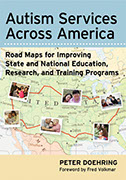 (2013). Autism Services Across America: Roadmaps for Improving State and National Education, Research, and Training Programs. Paul H. Brookes Publishing Co., Baltimore, MD
(2013). Autism Services Across America: Roadmaps for Improving State and National Education, Research, and Training Programs. Paul H. Brookes Publishing Co., Baltimore, MD
![]() (2016). Innovative approaches to developing a multi-agency, college-based ASD transition program. November. Ohio Center for Autism and Low Incidence Conference, Columbus, OH.
(2016). Innovative approaches to developing a multi-agency, college-based ASD transition program. November. Ohio Center for Autism and Low Incidence Conference, Columbus, OH.
Guideposts
![]() Other Lessons There is no natural pipeline of leaders trained and experienced in undertaking comprehensive program development
Other Lessons There is no natural pipeline of leaders trained and experienced in undertaking comprehensive program development
X
